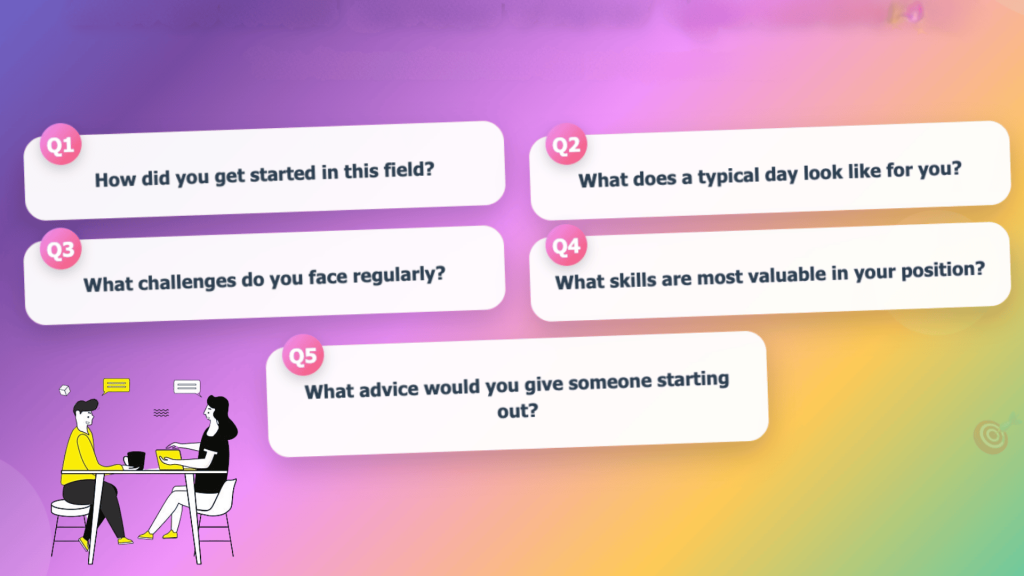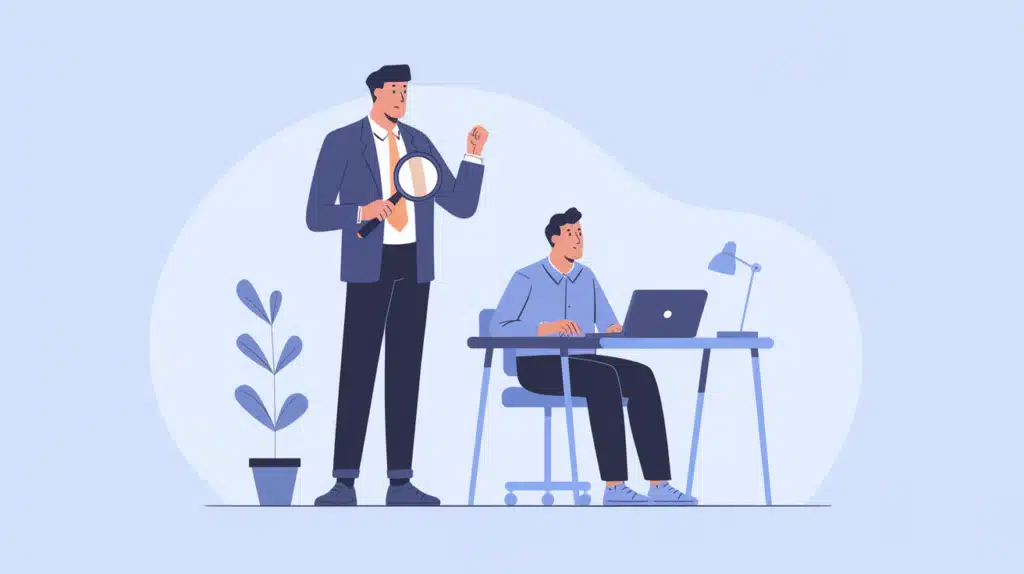Landing your dream job often starts with a simple conversation.
Informal interview questions can turn a brief chat into valuable career insights that shape your professional future.
Unlike formal job interviews, these relaxed conversations help you learn about real workplace experiences, industry trends, and hidden opportunities.
The right questions build genuine connections with professionals who can show you a career path.
These are proven informal interview questions that career experts recommend.
These questions will help you gain insider knowledge, expand your network, and make informed career decisions.
Ready to make your next conversation count?
What is an Informal Interview?
An informal interview is a relaxed, conversational meeting with a professional to gain insights about their career, role, or industry.
Unlike formal job interviews, it is not meant to assess or hire a candidate.
Instead, it focuses on learning about career paths, understanding workplace culture, and gathering practical advice.
These discussions help individuals build connections, see opportunities, and gain a clearer perspective on skills, roles, and industry trends.
Top 10 Informal Interview Questions with Sample Answers
These top 10 informal interview questions and answers PDF provides essential career insights directly from industry professionals.
Download here to access your free guide!
Sample answers provide guidance on the type of responses you might expect.
Q1: How Did You Get Started in this Field?
I started with an internship that introduced me to the industry and its practical aspects.
It helped me understand the workflow and daily responsibilities.
Networking during that time opened doors to my first full-time role.
Early guidance from mentors shaped my career path and growth decisions.
Q2: What Does a Typical Day at Work Look Like for You?
A typical day includes team meetings, client calls, and project updates.
I also spend time planning, analyzing, and solving problems.
Each day varies depending on project priorities and deadlines.
Flexibility is essential to handle unexpected tasks efficiently.
Q3: What do You Enjoy Most About Your Role?
I enjoy the variety of tasks and learning opportunities each day.
Seeing the impact of my work on projects and clients is rewarding.
Collaborating with a talented, supportive team adds to the experience.
I also value the creative problem-solving that challenges me regularly.
Q4: What Challenges do You Face Regularly in this Role?
Managing tight deadlines and shifting priorities can be demanding.
Balancing multiple projects requires focus, time management, and adaptability.
Unexpected changes often require quick problem-solving and decision-making.
Despite the challenges, they make the work dynamic and engaging.
Q5: How would You Describe the Company Culture Here?
The culture is collaborative, supportive, and encourages teamwork.
There’s a strong emphasis on professional growth and learning.
Employees are encouraged to share ideas, innovate, and contribute actively.
Open communication and feedback make it a positive work environment.
Q6: What Skills are Most Valuable to Succeed in Your Position?
Communication, problem-solving, and analytical thinking are critical.
Adaptability and time management also play a major role.
Being proactive and willing to learn helps handle complex tasks.
Interpersonal skills are essential for collaborating effectively with teams.
Q7: What Advice Would You Give to Someone Starting in this Field?
Be curious and eager to learn from experiences and colleagues.
Seek mentorship and guidance early to navigate challenges successfully.
Stay persistent, open-minded, and willing to take on new opportunities.
Building a strong network helps accelerate growth and career development.
Q8: What Trends do You See Shaping the Future of this Industry?
Digital transformation and emerging technologies are driving change.
Companies are increasingly adopting AI and automation for efficiency.
Staying updated with trends is essential to remain competitive.
Understanding new tools and practices can create long-term career advantages.
Q9: Are There Courses or Resources You’d Recommend for Growth?
Industry-specific certifications enhance knowledge and credibility.
Online courses and workshops provide practical skills for daily tasks.
Networking through professional associations offers learning and mentorship opportunities.
Attending webinars and conferences keeps you informed about industry developments.
Q10: Can You Suggest Others I Should Connect with?
Connecting with colleagues in related roles gives diverse perspectives.
Joining professional groups and associations helps expand your network.
Mentors provide guidance and advice for career decisions and challenges.
Building meaningful relationships opens doors to opportunities and insights.
Best Questions to Ask in an Informational Interview

When preparing for an interview, asking thoughtful and structured questions helps you gain meaningful insights about someone’s career, role, and industry.
About Career Journeys
Q11. How did you get started in this field?
Q12. What inspired you to pursue this career?
Q13. Which experiences helped shape your career direction?
Q14. What major decisions had the biggest impact on your path?
Q15. If you could go back, what would you approach differently?
Summary: These career questions show how professionals entered their field, what inspired their choices. The the key experiences or decisions that shaped their path, offering insights into lessons learned along the way.
About the Role and Responsibilities
Q16. What does a typical day or week look like for you?
Q17. What aspects of your role are most rewarding?
Q18. What are the toughest challenges you deal with regularly?
Q19. What skills or qualities are most valuable in your position?
Q20. Which types of projects do you find most engaging?
Summary: These questions focus on daily responsibilities, highlighting what makes the role rewarding, the challenges faced, and the essential skills required.
They also reveal which projects bring the most engagement, offering a clearer picture of the position.
About the Company and Industry
Q21. How would you describe the work culture at your company?
Q22. What makes this company stand out from its competitors?
Q23. What major changes are currently shaping your industry?
Q24. How do you see the industry evolving in the next few years?
Q25. Which tools, trends, or technologies are becoming essential?
Summary:These questions highlight company culture, strengths, and industry shifts while exploring future trends and essential technologies.
They help candidates understand both the workplace environment and the broader direction of the industry.
About Career Growth and Advice
Q26. What advice would you give to someone starting in this field?
Q27. Are there specific courses, certifications, or resources you’d recommend?
Q28. What habits or practices helped you grow professionally?
Q29. What common pitfalls should newcomers avoid?
Summary: These questions focus on professional development, asking for guidance on starting out, recommended learning resources, and effective habits.
The common mistakes to avoid, helping newcomers build a strong foundation for long-term career success.
Questions About Networking and Next Steps
Q30. Are there professional organizations or groups worth joining?
Q31. Which events, conferences, or communities do you find valuable?
Q32. What’s the best way to keep up with news in this industry?
Q33. Can you recommend others I could connect with to learn more?
Summary: These questions focus on networking opportunities, from joining professional groups and attending events to staying updated on industry news.
They also foster connections with others, helping candidates expand their relationships and grow their professional network.
How to Prepare for an Informal Interview?
Preparing for an informal interview ensures you make the most of the conversation and gather valuable insights.
Start by researching the professional’s background, role, and company to ask relevant questions.
Prioritize your top 5–7 informal interview questions to keep the discussion focused and engaging. Practice active listening and be ready to take notes.
Dress appropriately for the setting, maintain a professional yet conversational tone, and plan a polite follow-up to thank the professional, reinforcing your interest and building your network.
Professional Etiquette and Follow-Up Tips
These proven etiquette strategies help you leave a lasting impression and open doors to future opportunities:
- Respect time boundaries – Stick to the agreed meeting duration, usually 20-30 minutes
- Listen actively – Take notes and ask follow-up questions based on their responses
- Avoid being transactional – Focus on learning rather than immediately asking for job leads
- Send thank-you emails – Within 24 hours, mention specific insights they shared
- Stay connected – Share relevant articles or updates occasionally to maintain the relationship
- Offer value back – Look for ways to help them or make introductions when possible
What Questions a Candidate Could Ask Employers Naturally
Q1 What qualities do you value most in your team members?
Q2 How do you support professional development here?
Q3 What do successful employees in this company usually have in common?
Q4 How do you measure success in this role or team?
Q5 What’s one thing you wish new hires asked before joining?
Summary: These questions focus on understanding the key qualities valued in team members, how professional development is supported. They also provide insights into success metrics and considerations for new hires.
Difference Between Formal and Informal Interview
A formal interview is a structured process, often part of a hiring procedure, where employers assess a candidate’s qualifications against job requirements.
It follows a set format with specific questions and expectations.
An informal interview, on the other hand, is more conversational and is usually initiated for the purpose of learning and networking.
It focuses on sharing experiences, career insights, and company culture.
Both formats provide value, but the purpose and tone differ significantly.
Conclusion
Using the right informal interview questions changes simple conversations into valuable career insights and lasting professional relationships.
These questions help you understand career paths, industry trends, and growth opportunities that job postings never reveal.
Career professionals who master informal interviews consistently report stronger networks, clearer career direction, and better job opportunities.
The key lies in asking thoughtful questions that show genuine interest in the other person’s expertise.
Adapt these questions to your specific career stage and goals for maximum impact.
Ready to start meaningful career conversations?
Choose questions from this list and schedule your interview this week.
Frequently Asked Questions
What Is the Star Method in Interviewing?
The STAR method uses Situation, Task, Action, and Result to structure interview answers.
This framework helps you tell complete stories that demonstrate specific skills and achievements clearly.
What Impresses Interviewers the Most?
Thoughtful questions, genuine interest in the role, and specific achievement examples impress interviewers the most.
Clear communication about how you add value also stands out significantly.
What Is the Secret to a Good Job Interview?
Thorough preparation combined with authentic conversation creates interview success.
Research the company, prepare specific work examples, and focus on building a genuine connection with interviewers.










